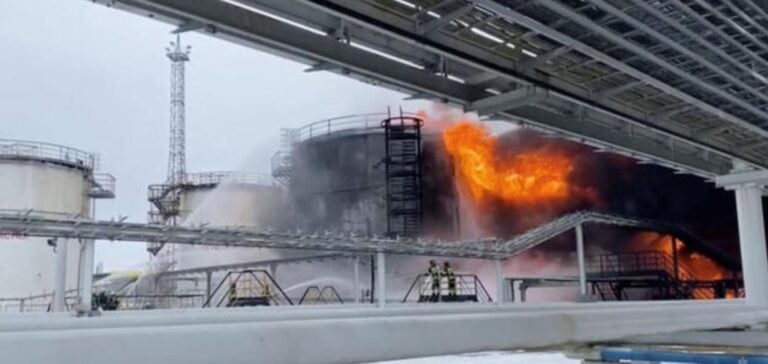Ukraine has claimed responsibility for a successful military operation against an oil refinery in Azov, in Russia’s Rostov region. This night-time drone attack caused a major fire at the oil installations, according to Vassili Goloubev, governor of the region. The latter confirmed on Telegram that there were no casualties. Local forces quickly mobilized resources to bring the fire under control. A total of 208 firefighters, 39 vehicles and a fully-equipped train were deployed. A Ukrainian defense source, speaking on condition of anonymity, hailed the attack as a success, claiming that “powerful fires” had broken out in the targeted facilities.
Background and strategic objectives
This offensive is part of a series of more than 20 attacks claimed by Ukraine against Russian oil infrastructures in recent months. Kiev justifies these actions as retaliation for the incessant bombardment of its territory. The aim is clear: to weaken Russia’s economic potential and disrupt the enemy’s rear lines. On the ground, Ukrainian forces continue to resist Russian assaults. On Tuesday, the Ukrainian army reported that Russian troops are still trying to penetrate the vicinity of Chassiv Iar, a strategic town in the Donetsk region. The capture of this locality could enable Russian forces to advance more rapidly in the Donbass.
Evolution of the Military Situation
The fighting is not limited to the Donbass. Further south, Moscow’s troops are also advancing towards Pokrovsk, threatening a key Ukrainian supply route. Despite this advance, a 24-year-old Ukrainian soldier nicknamed “Dykiï” said that Ukrainian military engineers are ready to create new routes to bypass the obstacles. Ukrainian forces continue to demonstrate their resilience. On Monday night, the Ukrainian Air Force intercepted ten Iranian-designed suicide drones. These drones, often used by Russian forces, represent a constant threat to Ukrainian infrastructure and troops.
Analysis and outlook
The escalation of Ukrainian attacks on Russian soil marks a turning point in this conflict. By targeting critical infrastructure, Ukraine seeks to weaken Russian logistics and the economy, while sending a clear message about its ability to strike far behind enemy lines. This strategy also aims to divert Russian resources from the Ukrainian front. International support, particularly in terms of intelligence and technology, plays a crucial role in these operations. The drones used by Ukraine bear witness to the technological evolution of its military capabilities. Ukraine’s ability to carry out such attacks depends largely on the continued support of its allies.
The series of Ukrainian attacks on Russian oil installations underlines Kiev’s determination to retaliate against Russian aggression. These actions, while inflicting economic damage on Russia, also demonstrate the importance of innovation and international support in modern warfare. The next few months will be crucial in assessing the impact of this strategy on the global conflict.






















